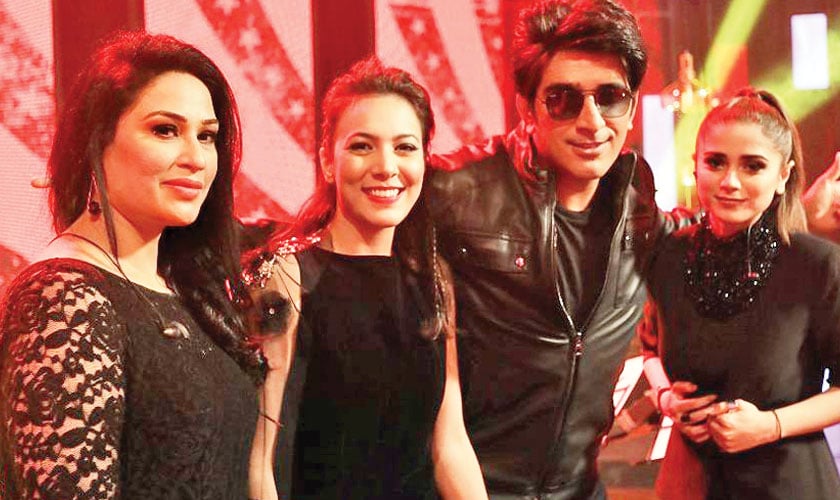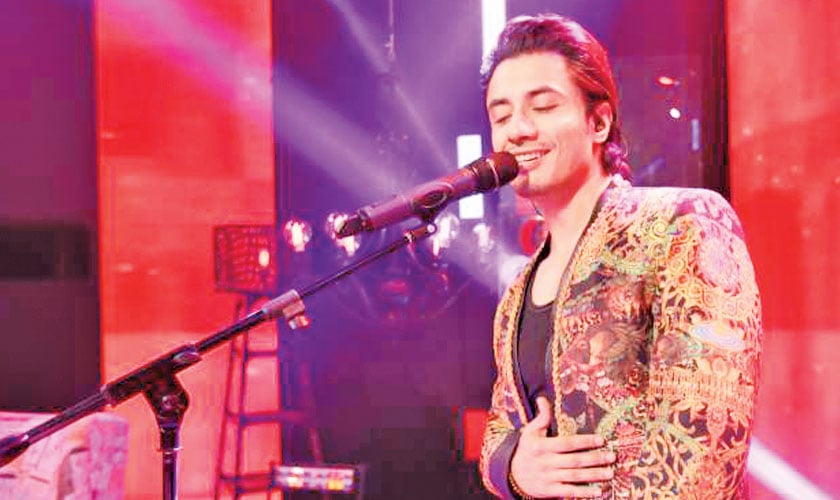The most well-known music property in the country and beyond (particularly India), Coke Studio ended its tenth season late last week in memorable and moving fashion.
Strings: Bilal Maqsood and Faisal Kapadia
MUSICMix
Strings stage a comeback as vocalists while remembering Junaid Jamshed, plus other highlights.
The most well-known music property in the country and beyond (particularly India), Coke Studio ended its tenth season late last week in memorable and moving fashion.
While the recently concluded tenth season had both moments of miraculous music and some less than appealing efforts, the material offered in the last two episodes certainly elevated matters.
Though cover songs are still very much a part of the format and those numbers need to be reduced, with participation of nearly 40 artists this year including several noteworthy collaborations, the show has managed to shine a light on artists who fall under the bracket of newer entrants as well as seasoned veterans.
Coke Studio has its imperfections but as always the bigger question staring us in the face is this: what happens if the production decides to not return? How will that vacuum be filled and what will it mean for the industry and artists who bank on a chance in the show to make it big?
There are no easy answers and as we think on long-term consequences, here’s a quick look at what transpired in episode six and seven.

Humera Arshad, Rachel Viccaji, Ali Hamza and Aima Baig.
Episode Six
The story begins with Salman Ahmed, who has redeemed himself somewhat after the disaster of ‘Sayonee’. Presenting ‘Ghoom Tana’, a well-known Junoon number that was originally co-sung by India’s Shubha Mudgal, Ahmed doesn’t sing in this instance and is joined by Momina Mustehsan (who sounds excellent by the way) and the girls of Irteassh instead. The latter too get their moment to shine. For the purpose of this concoction, Ahmed kept the original melody intact while the build up is reminiscent of the early days of Junoon.
Ali Hamza, currently flying high as solo music director in this season of Coke Studio, reinterprets a Nisar Bazmi composition while taking a backseat as vocalist. Instead he co-shares lyrical duty with Saifuddin Saif and lets the light shine on three radically different sounding vocalists. All three singers featured on the song such as Aima Baig, Rachel Viccaji and Humera Arshad, have different vocal textures and the song showcases that in charming fashion. With unpredictable music interludes and the merging of various styles including semi-classical and rock, it is one of the stronger collaborations to emerge from this season.
Shuja Haider, who seems to have a penchant for larger-than-life epic productions pays tribute to the late Nusrat Fateh Ali Khan with ‘Dam Mast Qalandar’ and things falter in this song. The arrangement feels congested and the vocals of Jabar Abbas and Umair Jaswal don’t go together. It is also one of the most overdone traditional covers and therefore feels pale in comparison to so many other renditions that live in memory.
Strings take on music direction duty with ‘Yo Soch’, a theatrical, encompassing ballad where Ali Zafar and Natasha Khan collaborate as vocalists. With this production, the music group reminds us just how good they can be as music directors and how natural it is for them to write a good pop song. Taking its cue from classic jazz, the song epitomizes the promise of love and evokes old-school romanticism. While the Pashto enunciation in the song is far from perfect, incorporating a regional language and taking ownership of it as our shared cultural heritage is an idea that has merit and therefore mistakes must be forgiven.
Episode Seven
The concluding episode of season ten of Coke Studio had equally entertaining musical moments as its predecessor such as Sajjad Ali’s ‘Tere Naam’ and Shafqat Amanat Ali Khan’s ‘Maula Tera Noor’ but the one undeniable moment of absolute glory emerged with the tribute to Junaid Jamshed in the form of the single, ‘Us Rah Par’. The music video of this J.J. single was originally directed by Bilal Maqsood so the tribute felt both genuine and poignant.

Ali Zafar
While Jaffer Zaidi took on music direction duties, Ali Hamza and Ali Zafar sang major portions of the song before being joined by Faisal Kapadia and Bilal Maqsood - who collectively form the music group, Strings. For the sake of the late Jamshed with whom the music group had personal association, they embraced the role of vocalists (for the first time since season two of Coke Studio).
The reinterpretation of ‘Us Rah Par’ by Zaidi is both flavourful and melodic. And the imagery of seeing different generations of music superstars coming together feels like the perfect tribute to an imperfect man whose voice will always take us back to the beginning when pure pop music had just begun in Pakistan and life seemed full of promise and hope.
It is also equally true that as Strings appear halfway through the proceedings, they kind of steal the show. With five studio albums to their credit, Strings remain the longest-standing music group in the country today and this appearance makes you wish they’d release a new album or at minimum sing more tunes if Coke Studio returns for another run next year.
Ali Hamza, Ali Zafar, Bilal Maqsood and Faisal Kapadia seemed genuinely happy in each other’s company and in these divisive times where the cola wars have led to many picking sides, this image of oneness is certainly applause-worthy and historic.
caption
(L-R) Humera Arshad, Rachel Viccaji, Ali Hamza and Aima Baig.